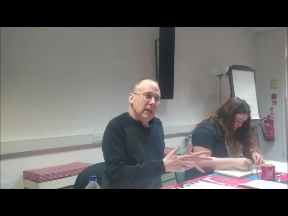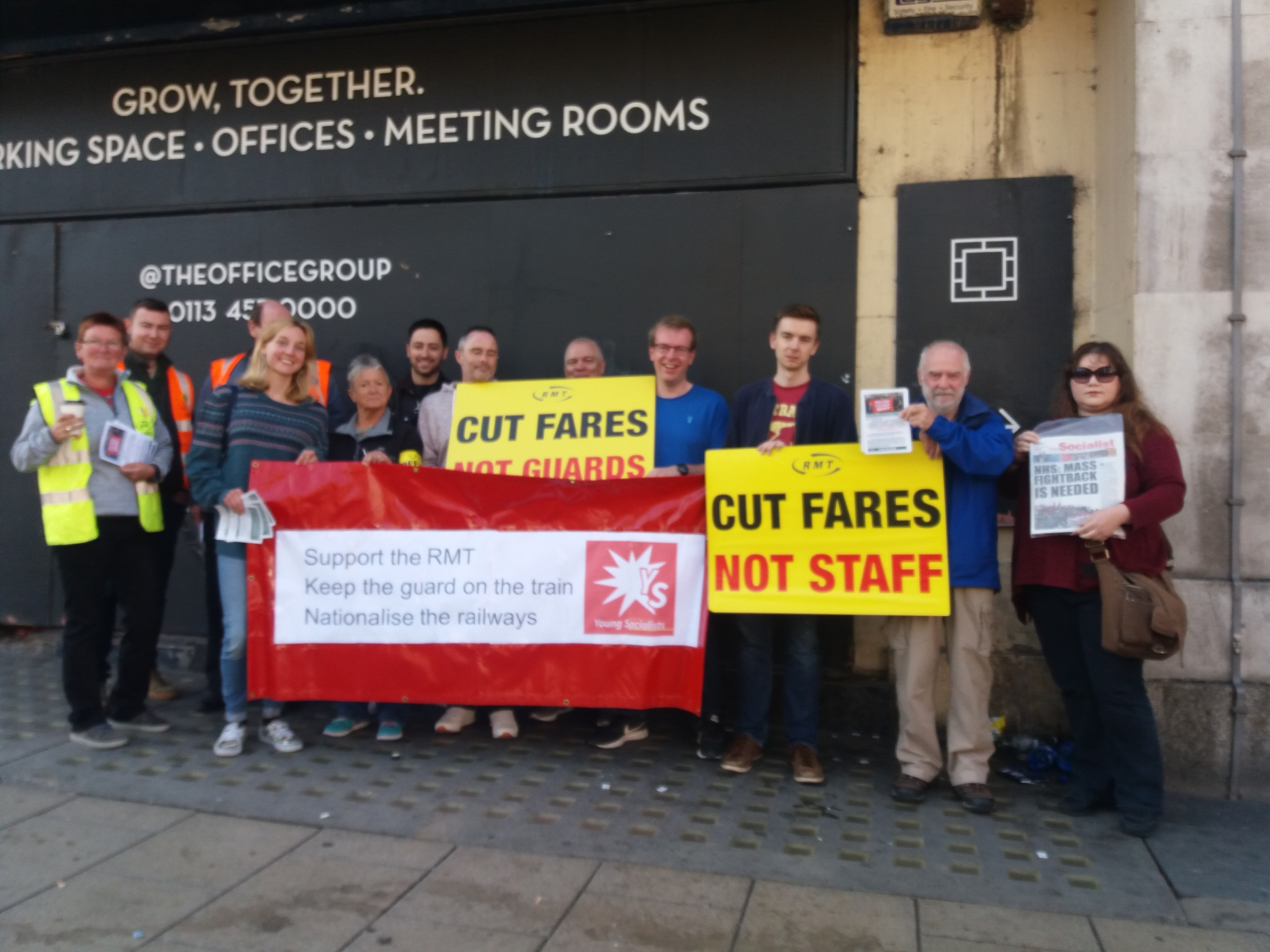
Clive Heemskerk speaking at Leeds People’s Budget Conference
This Saturday, Youth Fight for Jobs, alongside Leeds Unite Community, hosted the ‘We Need a People’s Budget Conference’ in Leeds to discuss how local authorities could challenge the cuts and set legal no-cuts budgets. The conference brought together campaigners from different groups including those fighting fire service cuts, the bedroom tax and cuts to Esol.
Iain Dalton, Yorkshire Organiser, Youth Fight for Jobs
Guest speaker, Clive Heemskerk, of the Trade Unionist and Socialist Coalition, who has advised councillors in places including Hull, Southampton & Leicester, on moving no-cuts budget amendment, gave an overview of the situation facing local authorities. He emphasised that whilst councillors can’t be a substitute for a mass movement, they can play an important role in building up a mass campaign in defence of public services, after all councils control 1/4 of all public spending.
He explained the most effective way of doing this is drawing up budgets that don’t make cuts to services. This has become known as the Liverpool Road following the budget set by the council in 1984/85, which was in fact a deficit budget with £30m missing from it which was won from the Thatcher government, the equivalent of £98m today. This allowed the council to carry out significant improvements to the lives of those in Liverpool, including building 5,000 council homes, more than were built across the whole country under the 13 years of New Labour goverment of Blair and Brown!
Clive pointed to the red herring put up by some, that anyone today is advocating not setting a budget. This he explained, was not the tactic of the Liverpool councillors, but something they went along with 1985-6 due to the front of around 20 Labour councils including those led by David Blunket (Sheffield), Graham Stringer (Manchester) and Margaret Hodge (Islington), who all rapidly retreated from the struggle leaving just Liverpool and Lambeth councils isolated. John McDonnell had some involvement in this at the time as one of those who opposed the retreat of the GLC under Ken Livingstone from this struggle.
Clive commented that it was also unfortunate that, despite being elected on an anti-austerity platform and calling on council’s to ‘band together to fight the cuts’, the new leader of the Labour Party, Jeremy Corbyn, had co-signed with John McDonnell and John Trickett, a letter which muddied the waters as to the opportunites for councils to resist, giving right-wing labour councillors the excuse to carry on cutting.
Councillors do have a duty to set a balanced budget, but as Clive commented, what a balanced budget is itself a matter of debate, and through moving no cuts amendments in a number of cities those around and working alongside TUSC had tried to advance this debate, in particular around the use of reserves and borrowing powers. (See TUSC briefing pack)
Before introducing Clive, the chair of the discussion, Leeds YFJ convenor, Tanis Belsham-Wray, had pointed out that in the council’s last statement of finances the usable reserves of Leeds City Council stood at over £390m, with those having increased by £65m in the last year. Nearby Sheffield council is dipping into some of the usable, but allocated (for PFI spending) reserves to put into a pensions deficit. If that could be done on that basis, then why not to stop the cuts?
Clive also explained that in their attempt to rebut the argument of TUSC councillors in Southampton to borrow to protect services, the council had instructed a QC to look at the legalities who had to admit that the 2003 local government act does allow councils to borrow to support revenue spending. The QC argued that this could not be done long-term, but then TUSC councillors weren’t arguing that, they were putting it forward as a short-term measure to allow time for a campaign to be built to win the necessary funding from the government.
In reality, the only argument against councils taking such an anti-austerity stand is that you would only have the ‘hope’ of winning such funding. But there are no guarantees in struggles – if you only campaigned when you knew you’d definitely win, then you’d never do anything!
Clive pointed out that when setting budgets for 1991-2, how many council officers expected that Margaret Thatcher would be replaced as Tory leader by John Major and one of his first acts would be to pump £3.4bn in to local government funding? But this is precisely what happened as a result of the mass campaign against the Poll Tax.
Of course, there is the fear of reprisals being taken against councillors if they took such a stand. The Clay Cross and Liverpool councillors were surcharged (fined) as a result of their stand. But on this, and some other issues, the situation is more favourable today, with the power to surcharge only now applying in cases of corruption.
The Corbyn letter to councils raises about council’s Section 151 officer (a senior council official) issuing a notice under Section 114 ordering them to take measures to bring a budget back into balance. The letter states “Failure to do so can lead to complaints against councillors under the Code of Conduct, judicial review of the council and, most significantly, government intervention by the Secretary of State”.
Whilst Clive regarded this as an accurate summary, when you break these measures down they are actually mostly toothless. In regards to this, he explained that if such a notice was issued, the council would have to meet within 21 days and discuss the advice, but there is no compulsion for the councillors to agree to it. A similar thing would happen if a council was taken to court by an auditor.
Potentially, they could be breaking the councillors Code of Conduct which they signed when they were elected. But what’s the sanction? As Clive explained, until 2011 councillors could be referred to the Standards Board which could have disqualified them from office for a period of up to 5 year. However, in 2011 during the ConDem government’s purge of quangos they abolished this body, replacing it with councils themselves setting up their own standards boards – so councillors would now be referred to themselves!
Clive argued that the abolishing of the Standards Commission, Audit Commission and other bodies, in part reflect a certain complacency by the establishment after they had defeated some of the mass struggles of the 80s and early 90s and capped this with the neutering of Labour Party with the expulsions, abolition of clause 4 and other measures. In 2014, Eric Pickles even removed the guaranteed legal protection for council chief officers if they were sacked by a council to have a guaranteed legal hearing.
Clive also dealt with the question of Commissioners, which he said was an important weapon for the government. But the process for sending in Commissioners requires a long process of inquests and other legal hearings. This power wasn’t used against Liverpool in the 1980s, where ex-government minister Patrick Jenkins explained that where there is a mass campaign ‘How do you get commissioners past half a million people, and how do you get them out again?
Clive pointed out we may get a taste of the difficulties of using these powers, if for example, hospital trusts refuse to implement the new junior doctor contract that Jeremy Hunt is trying to impose, as has been mooted.
This led to quite a wide ranging discussion, with the example of £300m being forced out of the government by Tory backbenchers refusing to vote for the Local Government Finance Settlement given as to how funding can be found if it is politically expedient. An Esol campaigner pointed out that as a result of their campaigning they’d managed to stop further funding cuts from taking place.
Several council workers commented on their efforts to promote a discussion on this matter in their union branch. One remarked that although the figures for reserves are printed in black and white in the councils own document, they were referred to as ‘fanciful’ in discussions in the branch. Undoubtedly, five years of the union nationally failing to take a lead to fight austerity has ground down activists throughout the union, but as was pointed out, not to respond to redundancies or attacks on pay, terms and conditions would be to ‘negate the whole purpose of a trade union’.
The afternoon saw an interesting discussion with Ellen Rowbotham from Hands off our Homes and Ben Mayor of Leeds TUSC discussing some of the campaigns they were involved in to challenge the council to use powers available to them to resist austerity.
Ellen explained how Hands off our Homes played a key role in opposing the bedroom tax in Leeds, which estimates say has affected 13,000 living in the city. Whilst evictions hadn’t taken place, the council had gone as far as taking people for possession hearings. Many tenants had support from Discretionary Housing Payments (DHP), however, these had become increasingly means tested pushing tenants into government ‘workfare’ schemes.
Hands off our Homes is now focussing on opposing the government’s Housing Bill which amongst other things includes lowering Housing Benefit for council tenants down to the levels of Local Housing Allowance in the private rented sector, which will take millions of pounds of funding away from councils. She encouraged everyone to attend the Housing Summit they are organising next month to discuss how to resist this. (See Eventbrite page for the Summit)
Ben explained how TUSC had lobbied the council over establishing a not-for-profit letting agency to tackle rip-off landlords and letting agencies. Although the council is now watering down this to what it calls an ‘ethical lettings agency’ which would only cater for certain landlords, it is still a step in the direction of showing that councils can try and intervene on this issue.
He also explained how TUSC had supported the RMT union in challenging the new franchise plans for Northern & Transpennine Express which include the introduction of driver-only operated trains. These proposals are being co-sponsored by a body, Rail North, made up of representatives of all the councils in the North of England, the vast bulok of which are Labour controlled. Ben pointed out that anti-austerity councillors should be using their influence to oppose such policies, as someone else pointed out with regards to government plans to hand councils powers over Sunday Trading regulations.
The conference closed by voting to establish a ‘Leeds People’s Budget Campaign’ to work towards trying to present a no-cuts budget amendment to next year’s budget, either via working with sympathetic councillors to do so, or a deputation to the council on the issue. In the meantime, we will seek to mobilise those fighting local government cuts together. As one of the conference attendees expressed, an idea is only as effective as the people you can mobilise behind it.












Young Socialists actions help force government U-turn on exam grading
August 23, 2020 by socialistiain Leave a comment
York Young Socialists stall on A-level results day 2020 – photo Iain Dalton
Across the country a growing movement of young people has forced the government and exam boards to abandon the biased algorithm which was being used to grade students GCSE, A-Level and BTEC results. Young Socialists called a day of action around the A-level results being announced, as well as a protest at Downing Street which helped kickstart protests being organised around the country. At the time of publishing these reports, BTEC students are still awaiting their results.
We believe that the regraded BTEC results should be released urgently, as delays could cost students jobs and university places, but we are also calling for university places to be fully funded for all who have applied for them, as well as a programme of creating decent permanent jobs in socially useful areas, such as building council housing.
Barnsley Young Socialists stall on a-level results day 2020 – photo Alistair Tice
Josh Fields, BTEC student and Young Socialists activist commented
“While A-level students were dealing with downgrading, I and many of my peers were yet to even receive our BTEC grades! This delay not only adds mental stress, but means if we receive marked-down grades we might not have enough time to appeal before university deadlines.
As a working-class student, I already faced struggles. I had to rely on a poorly financed bursary system that barely covers food and travel on a week-to-week basis.
I had to take a year off education before attending college to work full-time just to put myself through supposedly free education.
No A-level students were expecting the severe downgrading that occurred. Grades had been predicted on what the tutors expected, yet many students received much under this.
But most private schools and colleges were hardly affected by these grade cuts. The places hit hardest were in working-class areas.”
Hull Young Socialists stall on a-level results day 2020 – photo Paul Spooner
Hull protest report by Julia Louw
There was engagement with Young Socialists campaign stalls across Yorkshire from young people wanting to stop the unfair downgrading of results.
One student in Hull explained many of her friends had been disappointed by their results and were uncertain whether they would be able to go to university.
We cannot allow working-class youth to bear the brunt of Covid-19, and will continue to fight for a better education system.
Comment by Kat Gwyther, South Yorkshire Young Socialists
“On 13th August 2020, A-Level students across the United Kingdom received their results. Due to the ongoing COVID-19 pandemic, these results were not the product of formal assessment but rather based on assessments submitted by teachers and schools, or so everyone thought.
However, the Office of Qualifications and Examinations Regulation (Ofqual) introduced an algorithm that resulted in 40% of all A-Level students receiving final grades which were below the submitted teacher assessed grades. On paper, this meant that some students who were predicted to receive C’s got U’s, and those predicted to get A’s received C’s.
This was not a case of a student missing a grade boundary by one or two points, it was a government failing delivered via Ofqual’s algorithm. There was also the question of a disparity among those who got their results downgraded with working-class students disproportionally affected by this algorithm.Labour MP for Hove, Peter Kyle, perfectly highlighted this, tweeting: “This is a ‘levelling down’ govt. ‘A’s up by 4.7% in private schools, 0.3% in sixth form collages [sic]. Locally, ‘U’s increased by 3x in one school and 66% of teacher assessments downgraded in another. Aspirations crushed, hard work ignored, social mobility destroyed.”
Dr Michelle Meadows, who is the director for strategy, risk and research at Ofqual, stood by the validity of the algorithm and argued that students from low socio-economic backgrounds were generally given inflated predicted grades which they would not necessarily achieve had the exams gone ahead as planned.
Not only has the algorithm attacked disadvantaged and working-class students but the appeals process also favoured those who could pay to change their grade with appeal fees ranging from £8 to £150, depending on the exam board and level of appeal.
The government soon did a U-turn on the results given via the Ofqual algorithm, instead of giving students the grades provided by their teachers’ assessment. However, this governmental failing resulted in outrage throughout society: student-led protests took place up and down the country, MPs from all parties criticised the process, social and traditional media were up in arms, and Young Socialists raised their voices in anger and action throughout the United Kingdom.
Interestingly, media reports of A-Level results tended to focus on the notion that the results were “unfair” and that they ignored all the hard work that students had put in in preparation for their final exams. These headlines imply that under normal, non-COVID, circumstances, exam results are a fair reflection of a student’s ability and do not discriminate based on their socio-economic background or other factors.
Sadly, this is not the case. While there may not be an algorithm that is actively downgrading working-class students, it is clear to see that the education system benefits white, middle- and upper-class pupils.
Middle- and upper-class students have access to a wealth of resources, like private tutoring and cultural knowledge, that working-class students are denied, not because they do not work hard enough but because their parents do not have the finances or time to provide these things for them.
For example, if a student goes on to study an Arts and Humanities subject, such as English Literature or Religious Studies, at a higher education institution, having some background knowledge of Classics and/or ancient history is incredibly useful. However, as most state schools do not teach Classics or Classics adjacent subjects like Latin, students who do not have access to private tutors, schools, or highly educated parents will join their course steps behind those who did have access.
The idea of a fair education system is not a reality in the United Kingdom under a Conservative government; the fiasco of this year’s A-Level results has highlighted this. The anger of this disaster must be used to fuel the action that works toward a fair education system where students are not penalised because of their postcode and parents’ pay check.”
Filed under Comment, YFJ Events Tagged with A-Level, Barnsley, BTEC, GCSE, Hull, results, York, Young Socialists